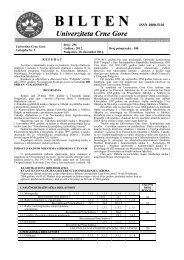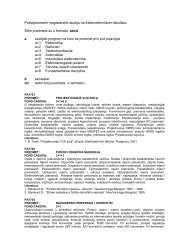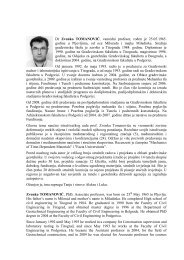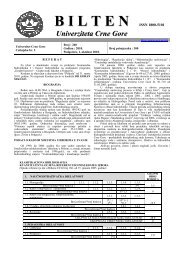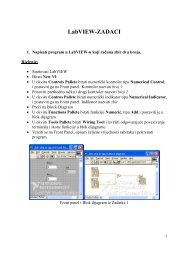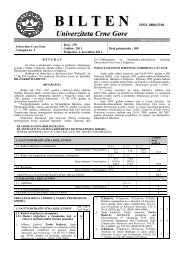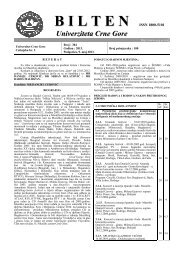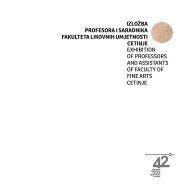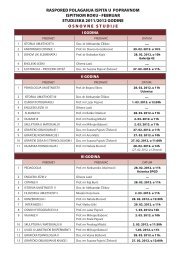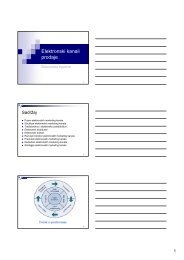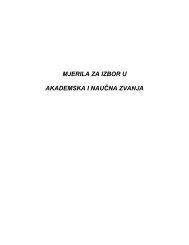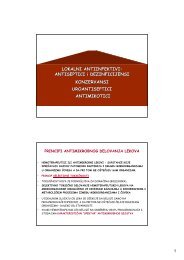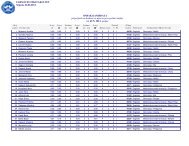WHO monographs on selected medicinal plants - travolekar.ru
WHO monographs on selected medicinal plants - travolekar.ru
WHO monographs on selected medicinal plants - travolekar.ru
Create successful ePaper yourself
Turn your PDF publications into a flip-book with our unique Google optimized e-Paper software.
<str<strong>on</strong>g>WHO</str<strong>on</strong>g> <str<strong>on</strong>g>m<strong>on</strong>ographs</str<strong>on</strong>g> <strong>on</strong> <strong>selected</strong> <strong>medicinal</strong> <strong>plants</strong><br />
Berberine has been used therapeutically for the treatment of cutaneous<br />
leishmaniasis, comm<strong>on</strong>ly referred to as “oriental sore”. It is administered<br />
by subcutaneous injecti<strong>on</strong> near the site of the lesi<strong>on</strong> (22–24). In patients<br />
with leishmaniasis caused by Leishmania tropica, injecti<strong>on</strong> of a preparati<strong>on</strong><br />
c<strong>on</strong>taining 2% berberine into the lesi<strong>on</strong>s was effective in the treatment<br />
of cutaneous leishmaniasis (22, 23).<br />
Adverse reacti<strong>on</strong>s<br />
Berberine is well tolerated in humans in therapeutic daily doses of 0.5 g (61).<br />
C<strong>on</strong>traindicati<strong>on</strong>s<br />
Cortex Phellodendr<strong>on</strong> is c<strong>on</strong>traindicated in cases of hypersensitivity or<br />
allergy to the plant material.<br />
Warnings<br />
No informati<strong>on</strong> was found.<br />
Precauti<strong>on</strong>s<br />
General<br />
No informati<strong>on</strong> was found.<br />
D<strong>ru</strong>g interacti<strong>on</strong>s<br />
N<strong>on</strong>e reported. However, berberine, the major isoquinoline alkaloid occurring<br />
in the c<strong>ru</strong>de d<strong>ru</strong>g, is reported to up-regulate the expressi<strong>on</strong> of the<br />
human multid<strong>ru</strong>g resistance gene coding for multid<strong>ru</strong>g resistance transporter<br />
(pgp-170), thus the treatment of tumours with berberine may result<br />
in reduced retenti<strong>on</strong> of chemotherapeutic agents such as paclitaxel<br />
(62, 63). In a randomized c<strong>on</strong>trolled clinical trial, 52 renal transplant recipients<br />
were treated with ciclosporin A and 0.2 g berberine three times<br />
daily for 3 m<strong>on</strong>ths, while another 52 subjects received ciclosporin A<br />
al<strong>on</strong>e (64). For a pharmacokinetic study, six renal transplant recipients<br />
were given a 3-mg/kg dosage of ciclosporin A twice daily before and after<br />
oral co-administrati<strong>on</strong> of 0.2 g berberine three times daily (i.e. berberine<br />
was given every 8 hours and cyclosporine every 12 hours) for<br />
12 days. The results of this study showed that the trough blood c<strong>on</strong>centrati<strong>on</strong>s<br />
and the ratios of c<strong>on</strong>centrati<strong>on</strong>:dose of ciclosporin A in the berberine-treated<br />
group increased by 88.9% and 98.4%, respectively, compared<br />
with those at baseline (p < 0.05). Thus, berberine can markedly<br />
elevate the blood c<strong>on</strong>centrati<strong>on</strong> of ciclosporin A in renal transplant recipients<br />
in both clinical and pharmacokinetic studies. This combinati<strong>on</strong><br />
may allow a reducti<strong>on</strong> of the dosage of ciclosporin A (64).<br />
252



